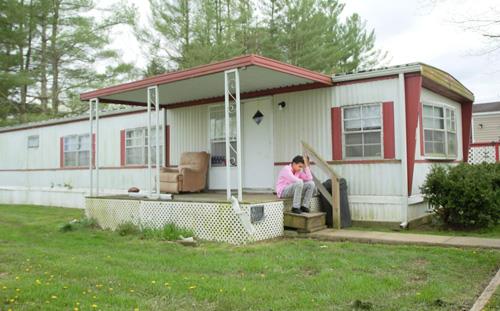
"I mean, it's a lot of pressure on me, but I try to do my best. If I feel sad or something, and I expressed that to my mom, it would make her feel sad, and so I just keep it to myself."
— Shawn, age 13, in Growing Up Poor in America, Tuesday on PBS' Frontline.
Several years ago — it seems like ages ago now — the veteran CBS newsman Scott Pelley presented a sobering segment for 60 Minutes in which Pelley documented the hollowing-out of the middle class in Orlando, Fla. in the wake of the last economic downturn.
Pelley followed middle-class families as they lost their jobs, then their homes, put their belongings into storage, sent their kids to different schools, and moved into cheap hotel rooms, hoping against hope that the economy would recover one day and they'd be able to reclaim a semblance of their former lives.
They didn't.
As Frontline documents in Tuesday's Growing Up Poor in America (9 p.m. ET, check local listings), it's happening again — only this time it's happening on a larger, more fundamental scale.
The decades-old belief, still held by some, that the poor are poor because they're "work-shy" — i.e., lazy — and looking for handouts, never seemed more dated. Growing Up Poor in America exposes the troubling reality of child poverty in America in the age of COVID-19.
Past is prologue, and once again, the future looks uncertain.
The numbers surrounding child poverty are sobering, but numbers don't tell the whole story, of course. Growing Up Poor in America is different from the usual cautionary tale of documentary news programs in one important respect: It's told from the perspective of the children themselves, as seen through their eyes and in their voices.
Filmmaker Jezza Neumann has been down this road before, in 2012's Poor Kids. Not much has changed in the intervening years — except that there's a different president and the political climate has changed.
Growing Up Poor in America follows three families — one black, one mixed race, and one white — in the battleground state of Ohio, one of a handful of states, most of them in the post-industrial heartland of the Midwest, that are once again poised to decide the fall elections.
This time, thanks to the pandemic, jobs are once again lost, schools are closing, and food banks are doing brisk business.
A 13-year-old child frets that his mother is struggling to get by on food stamps, even as he looks out for his toddler sister and admits to the cameras that, "There are some things I can't get."
Once again, storage facilities are doing brisk business, even as jobs in retail, restaurants, transportation, travel, and the service sector are evaporating into thin air. Once again, the pattern is repeating itself and keeps repeating: Families lose their most valued possessions and the memories that go with them when they can no longer make payments to keep their belongings in storage.
Those who do manage to keep their jobs in a global pandemic don't have it easy: A 12-year-old sees her mom putting in long hours at a gas station for little more than minimum wage, and says sadly, "My mom doesn't get paid as much as she should, because my mom works hard and she deserves a little bit more."
A little bit more. Not a life of luxury, but enough to get by on.
"We don't have school because of the coronavirus," she says. That may change now, as more schools reopen, despite fears that opening schools when new COVID cases are on the rise might not be a terrific idea. "My grades…right now, my schoolwork is not very well," she continues.
Factor in race and racism, police protests, and climate protests, and the future looks bleak.
"I actually am worried about the future," the 12-year-old says. "I just want us to be all right."
Frontline is not always easy to watch — that's the whole point. Growing Up Poor in America is no different.
Sometimes, though, it's good that people are told what they need to know, not necessarily what they want to hear.